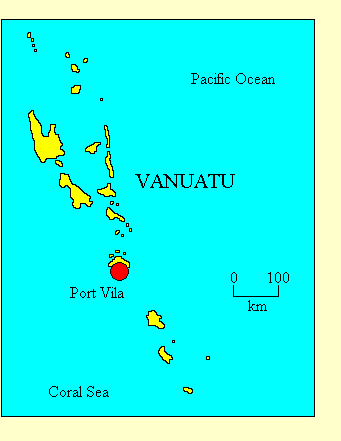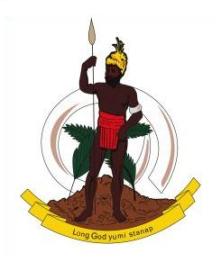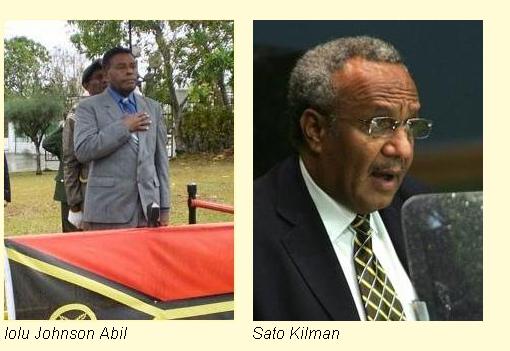

REPUBLIC OF VANUATU
• Official name: Republic of Vanuatu / Republique du Vanuatu / Ripablik blong Vanuatu
• Location: Pacific
• International organisations: African, Caribbean and Pacific Group of States, Commonwealth of Nations,
Non-Aligned Movement, Pacific Islands Forum, United Nations
• Borders: None
• Coastline: Coral Sea, Pacific Ocean
• Land area: 12,200 Km2
• Population: 240,000
• Annual GDP (PPP) per capita: US$4,800 (2009 CIA estimate). World ranking: 115
• Ethnicity: Almost the entire population is of Melanesian stock. There are small European and Chinese
minorities.
• Languages: English, French and a local English pidgin called Bislama are the official languages, but English is
the language of government, media and business. Many Melanesian languages are spoken.
• Religion: Most of the population are Christians, the majority Protestant. Many people follow indigenous cults.
• Form of government: Parliamentary democratic republic. Vanuatu is divided into six provinces.
• Capital: Port Vila
• Constitution: The
Constitution of Vanuatu came into effect on 30 July 1980.
• Head of state: The President, chosen for a five-year term by an electoral college consisting of
the legislature and the presidents of the regional councils. President
Iolu Johnson Abil took office on 2 September 2009.
• Head of government: The Prime Minister, appointed by the President. The
Prime Minister is the leader of the largest party in the legislature and is accountable to it.
• Legislature: Vanuatu has a unicameral legislature, the Vanuatu Parliament,
which has 52 members elected for four-year
terms from non-proportional multi-member constituencies.
• Electoral authority: The Vanuatu Election Commission administers elections.
• Freedom House 2009 rating: Political Rights 2, Civil Liberties 2

Political history
The Melanesian islands were first discovered by the Portuguese explorer, Pedro Fernandez de Quiros, in 1606. They
were rediscovered by James Cook in 1774, and named by him the New Hebrides. During the 19th century the islands were
partly colonised by missionaries, planters and traders, and increasing competition between British and French
interests led
to the establishment of joint British-French rule, known as the condominium. In 1887 the islands were placed under
an Anglo-French naval commission. The commission was replaced by a condominium in 1906.
Constitutional
development began in the 1970s, but independence was
delayed by the desire of the French to secure a dominant position for the French-speaking minority, and prevent
the English-language New Hebrides National Party (later the Vanuaaku Pati) coming to power. In 1979 the
French fomented a revolt on the island of Espiritu Santo, which was put down with aid from Papua New Guinea and Britain.
Elections were then held and the islands became independent in 1980. The Vanuaaku Pati under Walter Lini held
power until 1991, but since then the party system has fragmented and government has become increasingly unstable.
The Vanuaku Pati is still the largest party, but after the 2008 election it held only 11 of 52 seats.
The other main parties are the French-language Union of Moderate Parties (UPM) and the National United Party.
The Vanuaku Pati's Sato Kilman has been Prime Minister since
December 2010.
Freedom House's 2009
report on Vanuatu
says: "Vanuatu is an electoral democracy [but] parliamentary coalitions have been formed and dissolved with
increasing frequency since the 1990s, and fraud and bribery are widespread in elections... Corruption is a serious
problem and does not appear to be improving. Corruption allegations forced Prime Minister Barak Sope to resign in
2001. Vanuatu was ranked 109 out of 180 countries surveyed in Transparency International's 2008 Corruption
Perceptions Index... The government generally respects freedoms of speech and the press... The law provides for
freedoms of association and assembly, and the government typically upholds these rights... The judiciary is largely
independent, but it is weak and inefficient."
Updated March 2011
|

